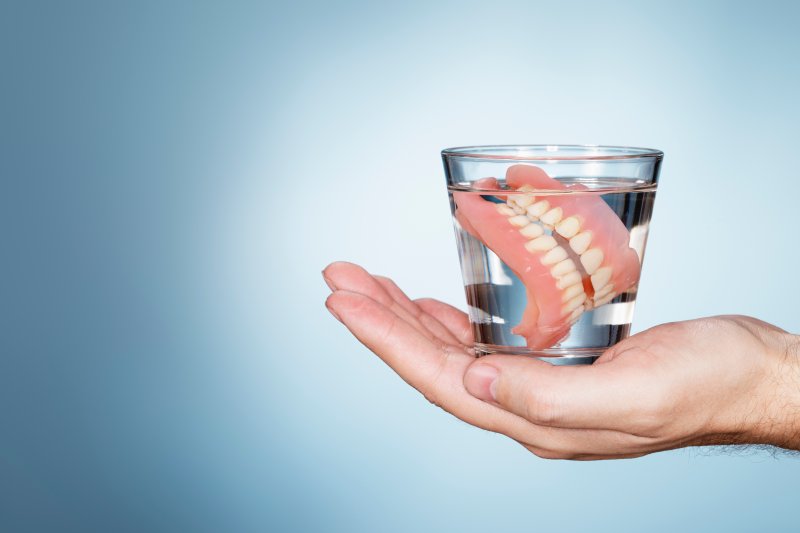
Wearing dentures can be difficult at first. It’s a brand-new feeling with a new set of “rules” to follow for everything from eating to oral care. Your dentist most likely told you everything you need to know about maintaining your new prosthetics, but you might need a refresher.
If you’re struggling with keeping up with your oral health with your dentures, continue reading. This guide will give you everything you need to know to care for your smile.
Follow a Daily Cleaning Routine
Proper denture care begins with a consistent daily cleaning routine. It’s best to brush and rinse your dentures after meals and snacks, just like natural teeth. Use a soft-bristled toothbrush and a denture cleaner or mild soap. Avoid regular toothpaste or other abrasive materials when you brush as they can damage your dentures.
Also, be sure to remove your dentures at night before you go to sleep. Leaving them in can cause bacteria to thrive under the prosthetic, increasing your likelihood of bad breath or gum disease.
How to Handle Your Dentures
Treating your dentures gently is an important part of maintenance. When you clean your dentures, be sure to do so over a bowl of water or put a folded towel down over the sink to prevent damage if they fall.
Dentures should be stored in a denture solution or cool water when not in use. Don’t use hot water can cause the prosthetic to warp.
Soaking your dentures overnight is important. You don’t want them to dry out, as this can lead to shape distortion or discomfort when you wear them.
How to Avoid Common Denture Damage
To keep your dentures in good condition, it’s good to avoid common habits that could cause your dentures to get damaged. For instance, don’t bite down on hard food or use your dentures to open packages or bottles. Doing so could cause fractures or chipping.
Get Professional Help
Above all else, it’s important to be communicative with your dentist when problems arise. If you experience any issues or damage, call them for professional guidance and repairs. Regular checkups are also crucial to assess the fit and condition of your dentures.
If you’re feeling any pain or discomfort, your dentures may need to be checked or relined. These are processes you can’t do on your own. As you continue using your prosthetics and learning, you’ll need to rely on your dentist less often, but for now, you should continue to lean on them until you have more experience.
About the Author
Dr. Erin M. Prach has always enjoyed helping people and exploring the depths of science. It’s no wonder she became a dentist! After earning her dental degree at the University of Colorado School of Dental Medicine, Dr. Prach began furthering her education with practical studies in oral surgery and sleep medicine. She continues her education today through multiple professional organizations. To schedule a denture consultation at Erin M. Prach, DDS, call (307) 337-4770 or visit the website to explore other services.
